
What are the 3 Pillars of Corporate Sustainability?
In this article, we'll explore what the 3 pillars of corporate responsibility are, why they're important, and how businesses can turn them into practical action.
ESG / CSR
Industries



As more companies seek to reduce their carbon dioxide and greenhouse gas emissions, carbon accounting software and the use of a carbon management platform have become more useful than ever.
Using carbon accounting software allows companies to be held accountable for their new environmental goals, methods to reduce their emissions, monitor their emission reduction progress, and be provided with expert advice on how to proceed with their business in a more sustainable manner.
What is the best carbon accounting software as of 2025?
In order to this question objectively, we've evaluated leading platforms against pivotal criteria including data accuracy, compliance capabilities, user experience, reporting features, and options to seamlessly integrate additional features.
In this article, we'll explain what carbon accounting is, why it's important to invest in carbon accounting software, and the best carbon accounting software as of 2025.

We know that taking the time to research and select the right carbon accounting software for your company can be a tedious and overwhelming process. In order to streamline your decision-making process, we've compiled a list of the top 10 carbon accounting platforms for 2025 to help make it easier for your company to manage its carbon emissions and remain compliant with evolving environmental regulations.
These are the best carbon accounting platforms to consider in 2025 to help your company with measuring emissions, ensuring regulatory compliance, and the development of sustainable solutions amidst the climate crisis.
| Platform | Why It Stands Out |
|---|---|
| 1. Greenly | All-in-one carbon platform with automation, compliance, and top-rated UX. |
| 2. Persefoni | Enterprise-grade carbon reporting with SEC support. |
| 3. Plan A | Decarbonization tools tailored for SMEs and suppliers. |
| 4. IBM Env. Intelligence | Built-in AI and ESG data modeling. |
| 5. Sphera | Strong industry-specific reporting capabilities. |
| 6. Sinai | Focused on emissions forecasting and scenario analysis. |
| 7. Emitwise (Now Watershed) | Automated emissions tracking for supply chains. |
| 8. Diligent ESG | Corporate-grade ESG compliance toolkit. |
| 9. Net Zero Cloud | Salesforce-native carbon management. |
| 10. Microsoft Sustainability | Good for companies already in the Microsoft ecosystem. |
Greenly is an emerging carbon accounting software and service based in France designed to help businesses of all sizes reduce their carbon emissions effectively.
With already 3,000 customers across the globe and growing, Greenly is one of the best choices for carbon accounting – as our international expertise, wide variety of resources, and team of climate experts make for an indispensable carbon accounting experience.
As we offer solutions for all companies regardless of industry or size, Greenly’s platform is the perfect choice for businesses seeking a comprehensive approach to reducing their environmental impact long-term. This is because we offer services not only related to reducing carbon emissions, but also to assist in other areas of a company that could impact their corporate carbon footprint – such as assistance with LCA, SBTi, and complex regulatory requirements like the CSRD.
Location: Paris, France
Pricing: Available on request via our clear pricing page
Best Suited For: Greenly stands out as an ideal choice if your company is seeking tailored carbon emission reduction strategies. As we combine the use of data analytics with insights from climate experts, Greenly is passionate about providing businesses with personalized plans for reducing their carbon footprint.
Key Features: Our platform includes practical, expert-driven solutions developed by our sustainability team, which can help your company to uncover actionable insights, ensure accurate emissions measurements, adhere to emissions reporting standards, identifying reduction opportunities, and develop sustainability goals aligned with your company's mission.
Although Greenly has traditionally been more focused on the European market, our rapid expansion has allowed us to take our businesses to the United States, the United Kingdom, and beyond. As Greenly continues to grow, we are dedicated to sharing our unique approach to reducing carbon emissions with the world – including companies located across Europe, the United States, and the United Kingdom.
A number of carbon accounting tools exist to help organizations in specific industries to better manage their carbon footprint. For example, ClearPath is widely used by U.S. local governments for community-scale GHG inventories, while SIMAP supports emissions tracking for universities and colleges. Sphera, on the other hand, offers advanced life cycle assessment (LCA) capabilities for larger enterprises partaking in manufacturing and industrial activities, meaning its complexity may limit accessibility for first-time, non-advanced users only dipping their toes in the water with carbon accounting.
More recently, platforms such as Gravity have also emerged – which has gained traction for its timely and accurate approach to ESG data collection.
While each of these tools provides a particular niche, Greenly offers a more intuitive, all-in-one platform tailored to businesses of all sizes. From robust Scope 3 tracking, personalized expertise, and real-time dashboards – Greenly provides both the depth and ease-of-use that many companies crave when seeking to develop an improved climate strategy without over-relying on consultants or industry-specific tools.
The table below will provide a short summary how Greenly could be the best option of them all for carbon accounting:
| Other Platform | Their Strength | Why Choose Greenly |
|---|---|---|
| ClearPath | Great for local governments | Flexible for startups to global enterprises |
| SIMAP | Built for universities & colleges | Scales with growing companies across sectors |
| Sphera | Advanced LCA features | Simpler, more user-friendly interface |
| Gravity | Appealing to new market entrants | Built for both emerging and established businesses |
Curious to see if Greenly is the right carbon accounting software for your business?
Take the first step towards reducing your carbon footprint by requesting a free and non-binding demo with one of our experts today and finding the solution that best fits your business needs.
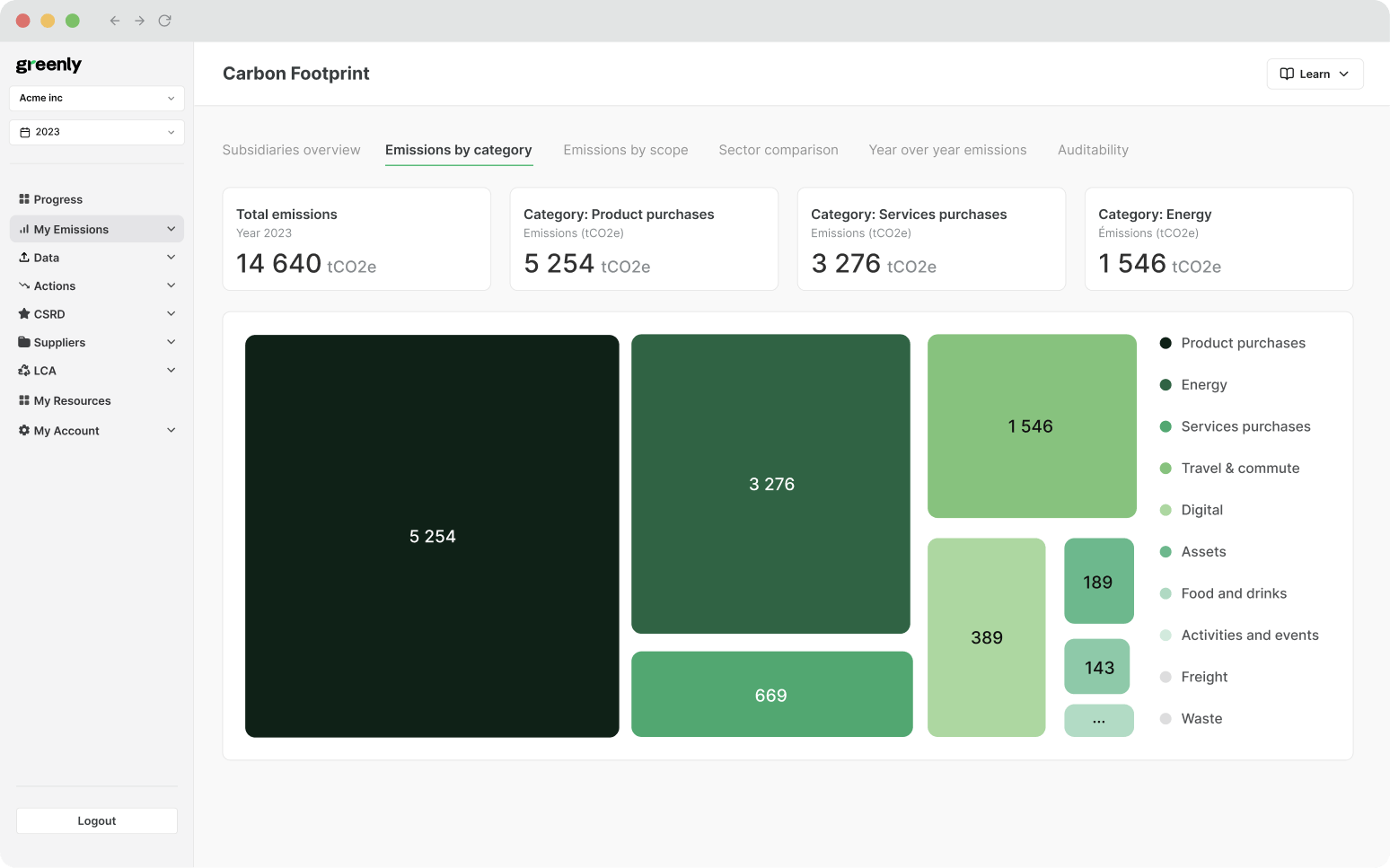
Persefoni stands out as one of the most experienced and well-connected carbon accounting platforms in the industry, with a global presence, including offices across the United States and internationally.
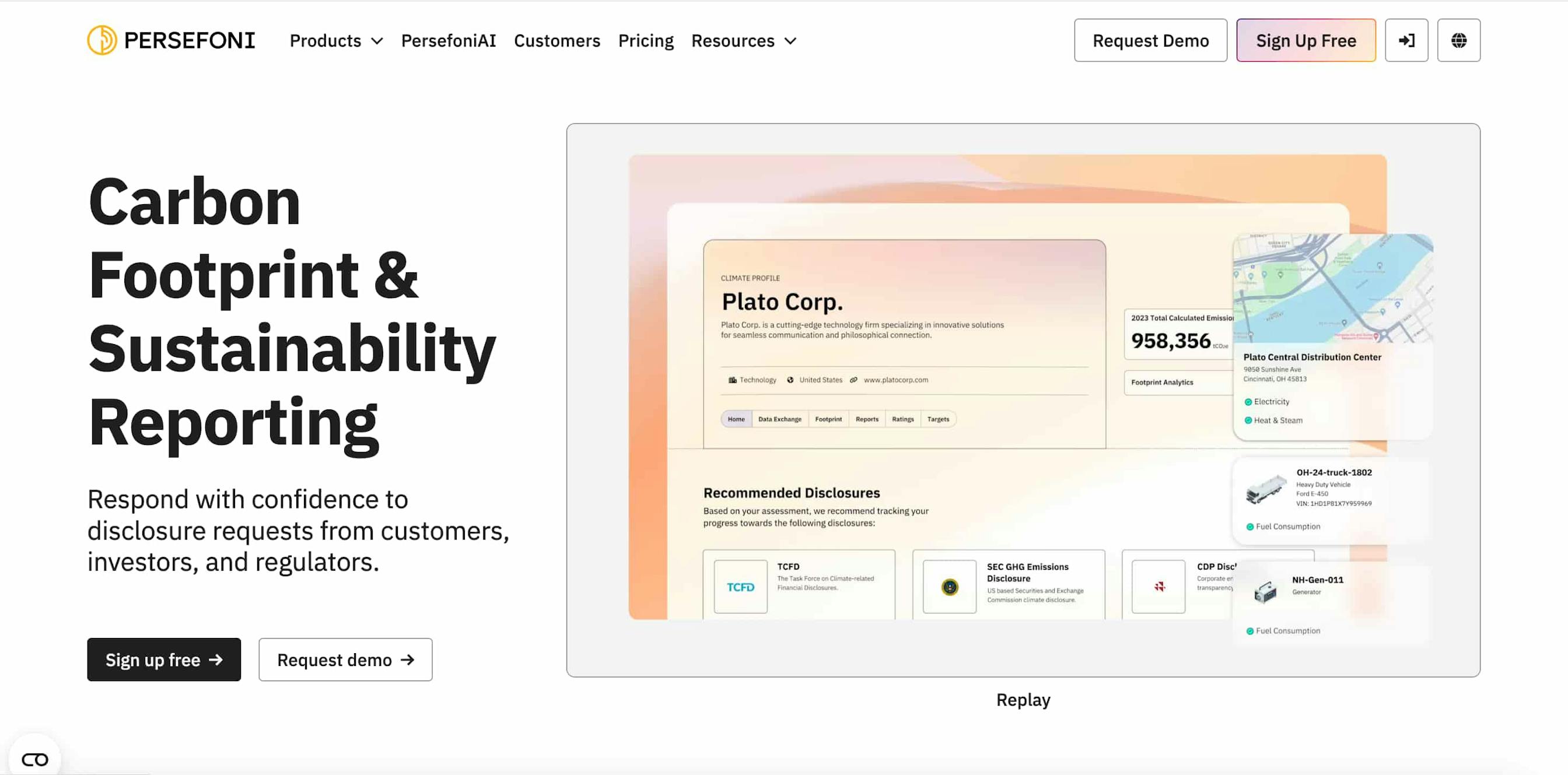
Persefoni is set apart by other carbon accounting platforms as a result of their extensive network of partnerships with several leaders in the industry, including:
These partnerships have allowed Persefoni to gain access to indispensable experience and extensive knowledge in sustainability reporting, data collection, and carbon accounting. As a result, Persefoni has developed an authoritative presence in the industry for their deep understanding of complex carbon emission reduction strategies.
Location: Mesa, Arizona
Pricing: ‘Pro’ plan at zero charge; ‘Advanced’ plan ranging between $55,000 – $250,000 per year
Key Features: One of Persefoni’s main selling points is its tamper-resistant platform, making it a trustworthy solution to securely share and send data between stakeholders. In addition to this, Persefoni is working towards integrating AI capabilities to help companies map their purchasing activity and ensure more precise emission factors.
Best Suited For: If you are an asset manager or a part of a large company seeking support from a company to complete both your financial reporting and carbon accounting, then Persefoni could work well for you.
For large companies or asset managers seeking support for both financial reporting and carbon accounting, Persefoni offers an effective platform. However, smaller businesses seeking a more personalized, tailored approach to carbon accounting may find us at Greenly to be a better fit.
Plan A is s carbon accounting software which helps organizations to understand complex sustainability regulations such as the Corporate Sustainability Reporting Directive (CSRD). Determined to go beyond the traditional metrics offered in carbon accounting software, Plan A works to offer personalized solutions for companies looking to actively reduce their environmental impact and achieve their climate goals.
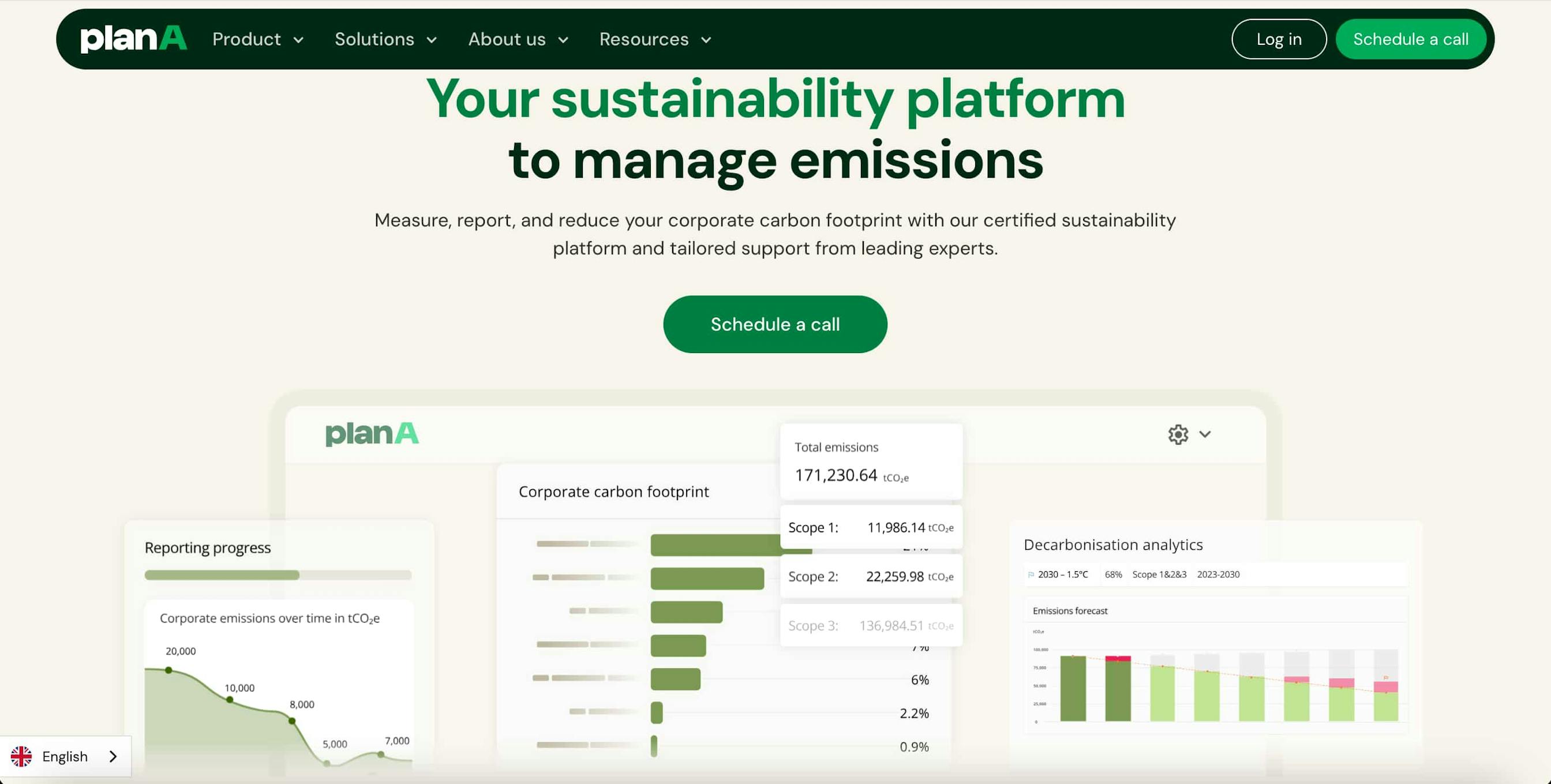
Location: Berlin, Germany
Pricing: Over $10,000 USD per year
Key features and tools offered by Plan A include:
Best Suited For: Plan A is an excellent choice for organization seeking a well-rounded, robust carbon accounting software that will allow them to both effectively reduce emissions as well as adhere to the newest industry standards and environmental regulations.

IBM Environmental Intelligence Suite is a carbon accounting software solution best designed for large companies, especially for organizations focused on mitigating future carbon emissions.
IBM’s strength lies in its ability to interpret large amounts of data. The suite provides climate risk analytics powered by artificial intelligence (AI), enabling businesses to assess and reduce carbon emissions effectively.
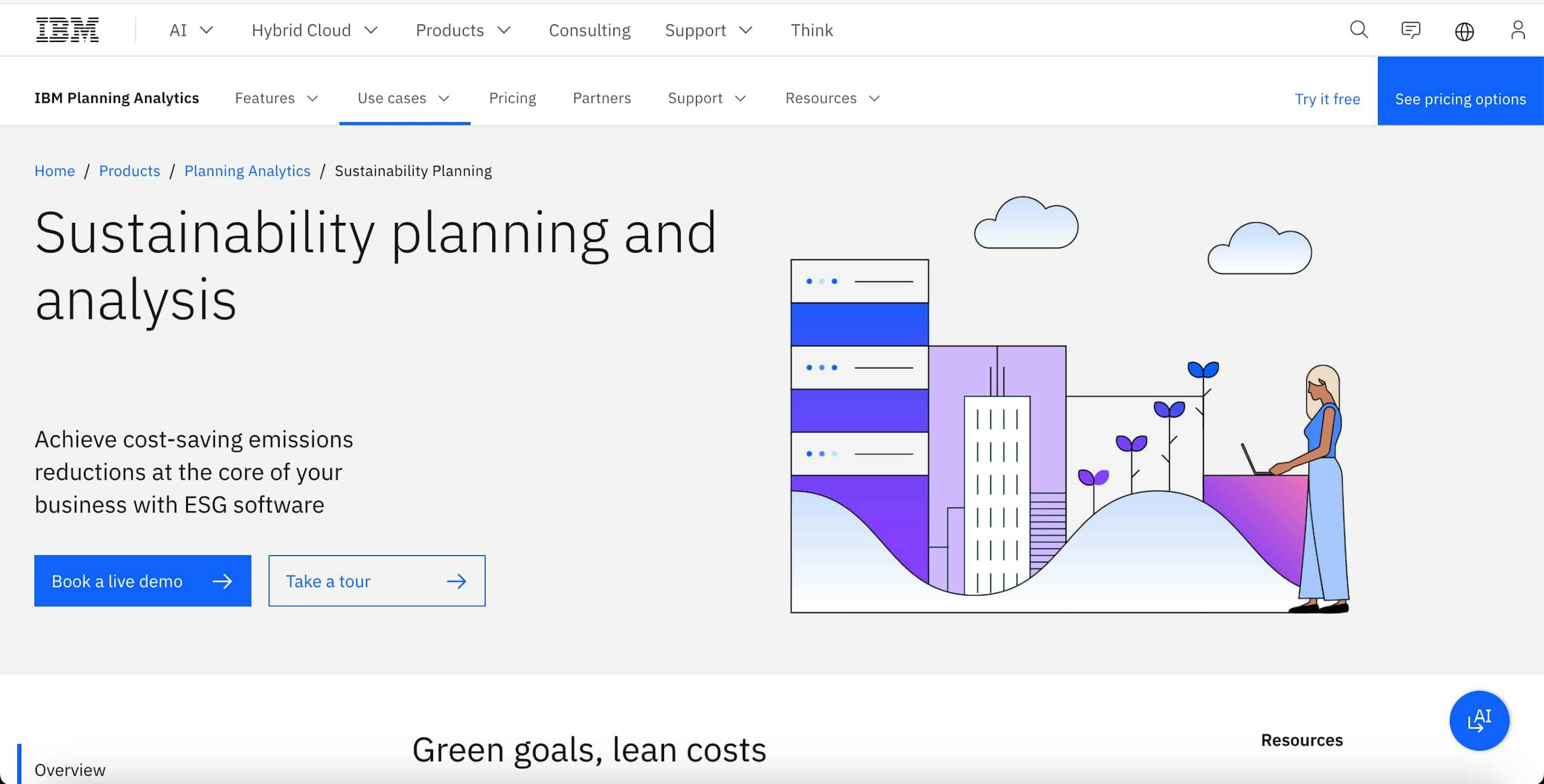
Location: Armonk, New York, USA
Pricing: Up to $134,000 USD per year depending on industry
Key Features: IBM Environmental Intelligence Suite relies on data, risk management, and AI to assist their customers with their carbon emission reduction tactics.
Best Suited For: Enterprises with complex emissions profiles seeking emission reduction opportunities. This is because IBM's platform is best equipped to handle large datasets and provide predictive insights. While IBM’s use of advanced technology to streamline carbon emissions analysis is effective, it's important to note that IBM Environmental Intelligence Suite may not be the best option for companies seeking a highly personalized experience.
Remember, IBM’s strong suit is its ability to compute large amounts of data via the use of technology – which can easily track and adapt carbon reduction tactics based on predictive modeling, enabling businesses to assess various future scenarios and determine the potential success or failure of their current emissions reduction efforts.
However, companies that prefer more personalized solutions with a more hands-on approach may find it less flexible.
Sphera is known to be a carbon accounting software that utilizes ESG (Environmental, Social, and Governance) performance and risk management to help clients reduce their carbon emissions. Sphera places a strong emphasis on safety and liability reduction, and seeks to prioritize these factors while establishing organizational methods as new sustainability solutions come to light.
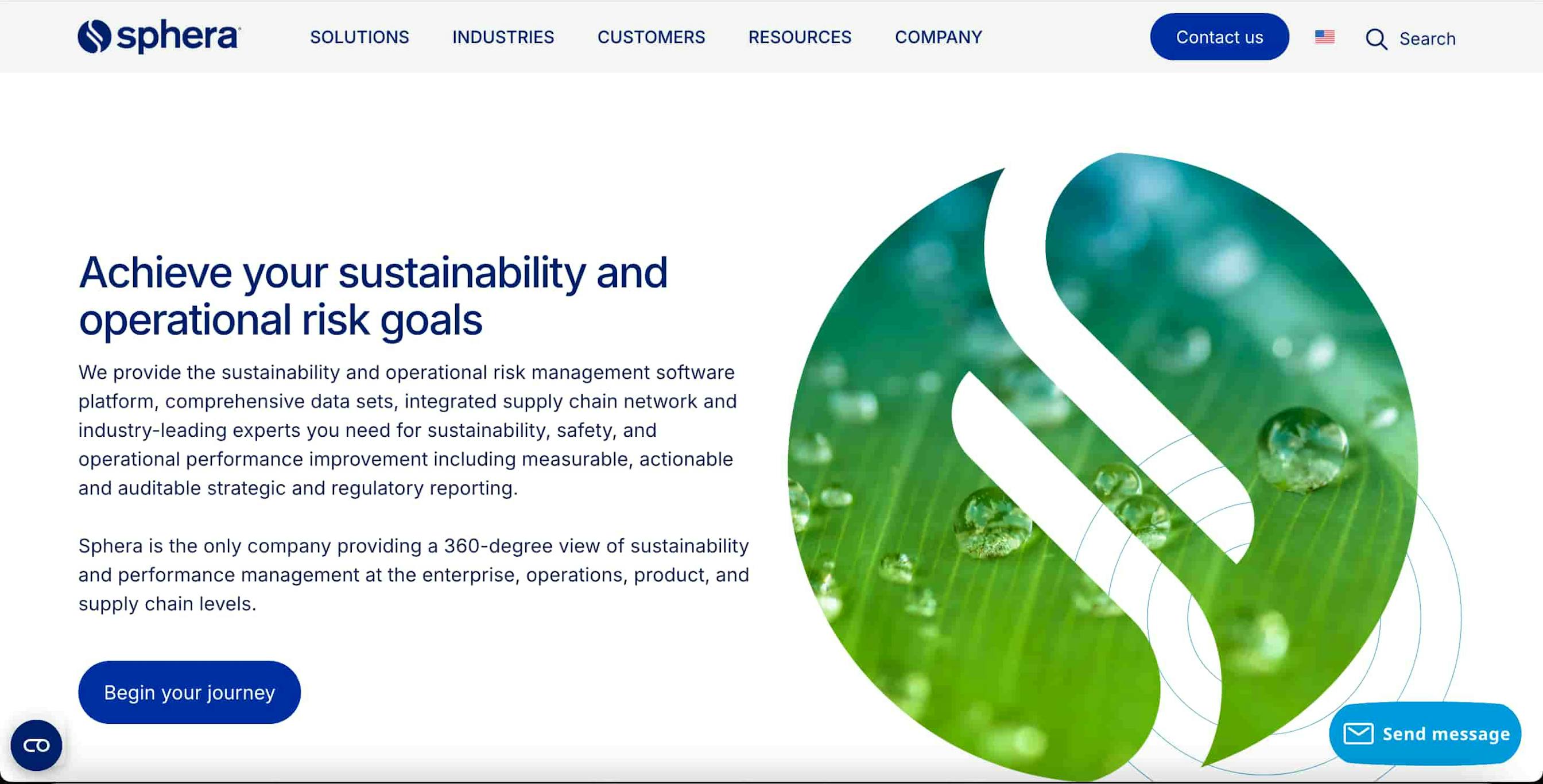
Location: Chicago, Illinois, USA
Pricing: Around $15,000 per year; specific pricing available per request
Key Features:
Sphera strives to achieve their mission of environmental positivity through:
Best Suited For: If safety is a primary concern for your company while working to reduce carbon emissions, whilst Sphera could be the right choice. However, it is important to note that Sphera does not have the same extensive partnerships or industry connections as other carbon accounting platforms.
Regardless, Sphera still offers a straightforward platform that makes integrating carbon emissions reductions easy – making it a valuable tool for businesses that prioritize safety and simplicity in their sustainability efforts.

Sinai technologies help companies reduce their carbon emissions with their unique modeling and planning efforts.
Sinai Technologies offers a unique approach to carbon emissions reduction with its advanced modeling and planning tools. Ultimately, their platform is designed to help companies reduce carbon emissions with precision and proactive planning – such as with their Climate Transition Planner or their Climate Financial Planner.
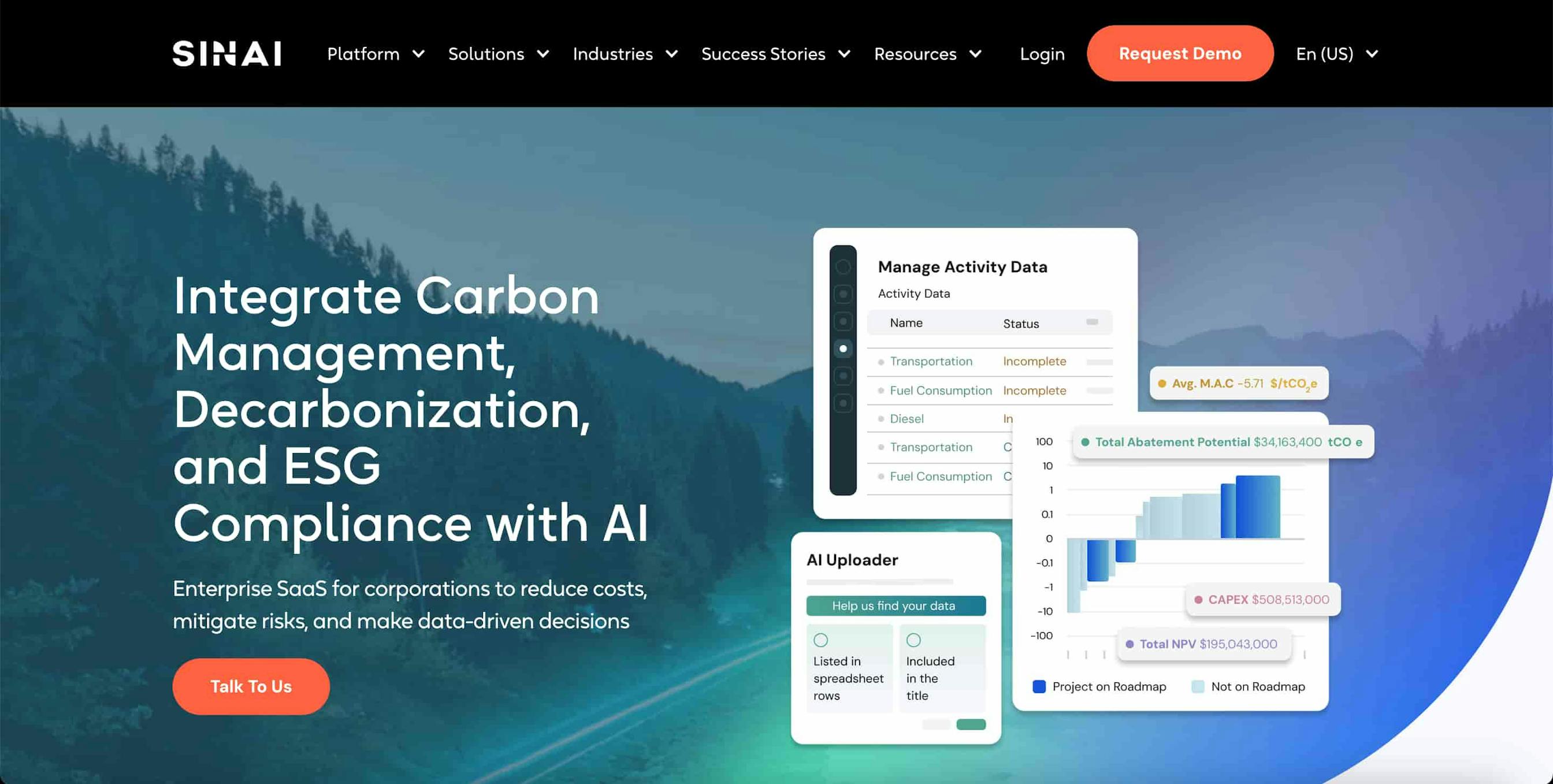
Location: San Francisco, California, USA
Pricing: Prices available on request
Key features and tools with Sinai Technologies include:
Regardless of these key features, it is important to note their features are limited and may not be the best carbon accounting software if your company is seeking an all-in-one carbon accounting software experience.
While Sinai Technologies offers valuable insights and tools, it’s important to recognize that its features are limited and that the platform may not serve as a comprehensive, all-in-one solution. Furthermore, the platform's interface is less user-friendly compared to other carbon accounting platforms, which may make seamless integration into business models more challenging.
Best Suited For: Regardless, Sinai Technologies still excels in delivering effective solutions for companies that already have existing sustainability framework in place. Its use of carbon budgeting, analytics, and precise emissions analysis has proven successful in helping businesses work toward net-zero emission goals.
Emitwise, now operating under Watershed, is a carbon accounting platform designed to help businesses measure, report, and reduce their carbon emissions – placing a high value on real-time emissions tracking across an organization’s operations and supply chains.
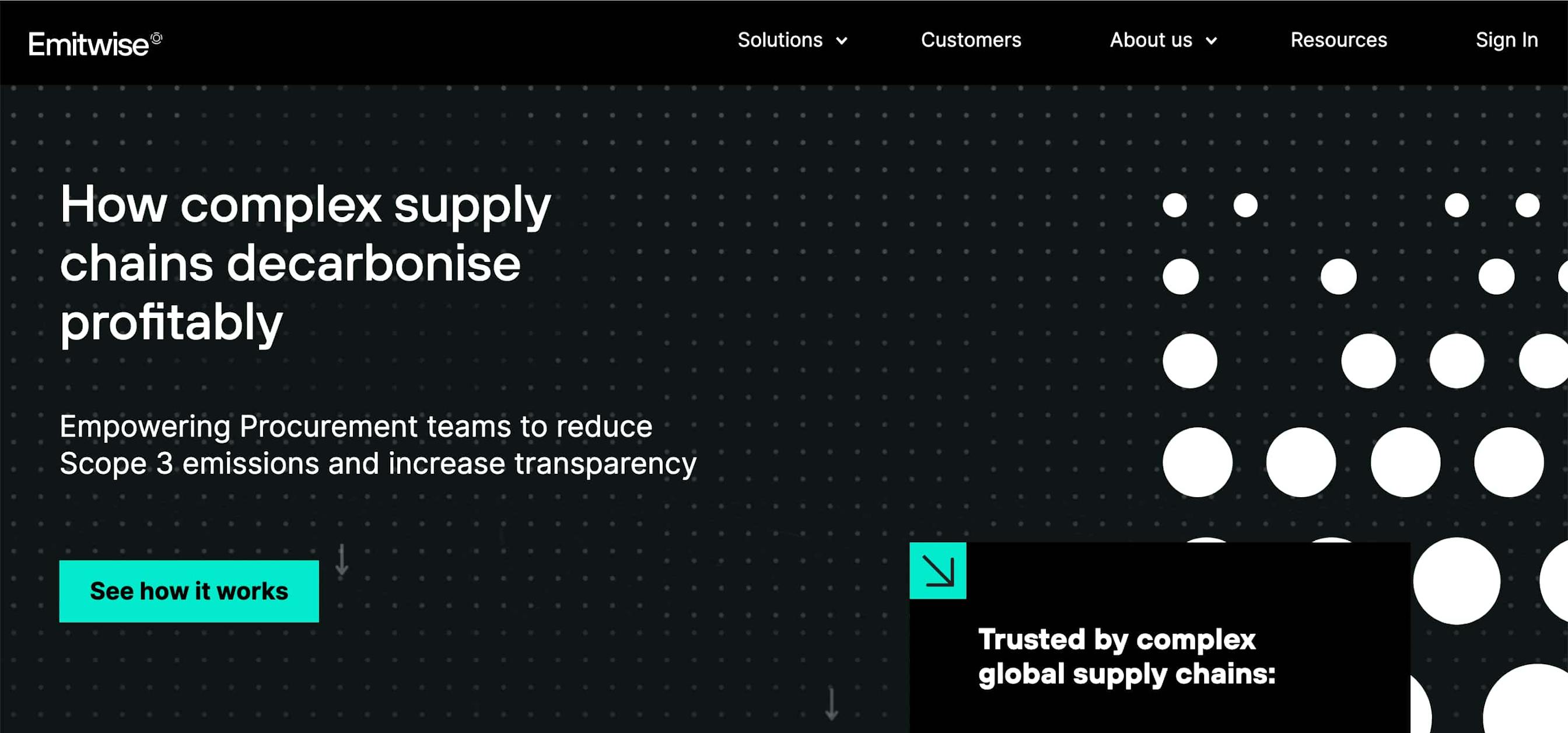
Emitwise leverages machine learning to streamline emissions data collection and align reporting with pivotal regulatory frameworks, such as the GHG Protocol and SECR. Built for transparency, Emitwise allows companies to ensure compliance obligations while also identifying carbon hotspots to implement effective reduction strategies.
Location: London, United Kingdom
Pricing: Up to $127,000 USD per year
Key features and tools offered by Emitwise include:
Best Suited For: That said, while Emitwise remains a highly valuable solution for mid-sized and large enterprises seeking transparency in their carbon footprint, it doesn’t have as many funding opportunities as other carbon accounting software does – making their platform more limited than others on this list.
Developed in New Zealand back in 1994, Diligent helps organizations to militate potential climate risks and ensure compliance.
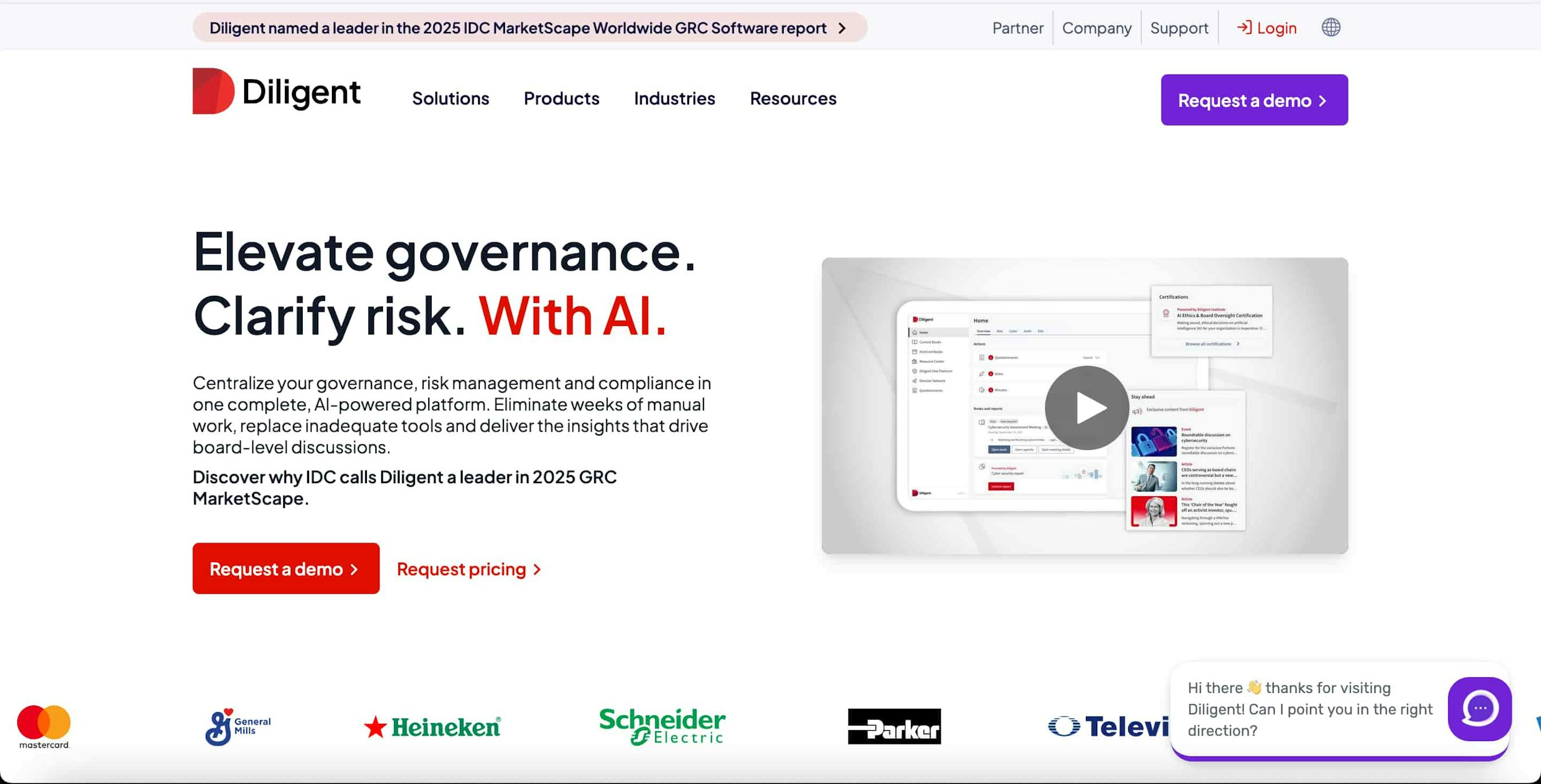
Location: New York City, USA
Pricing: Prices available on request
Key features and tools offered by Diligent include:
Best Suited For: Diligent is most effective for executives, non-profits, and governments seeking to utilize carbon accounting soft to avoid climate-related risks and mitigate potential legal fines.
Net Zero Cloud by Salesforce can assist organizations in tracking and reducing emissions with the help of in-house developed automation tools and embedded features.
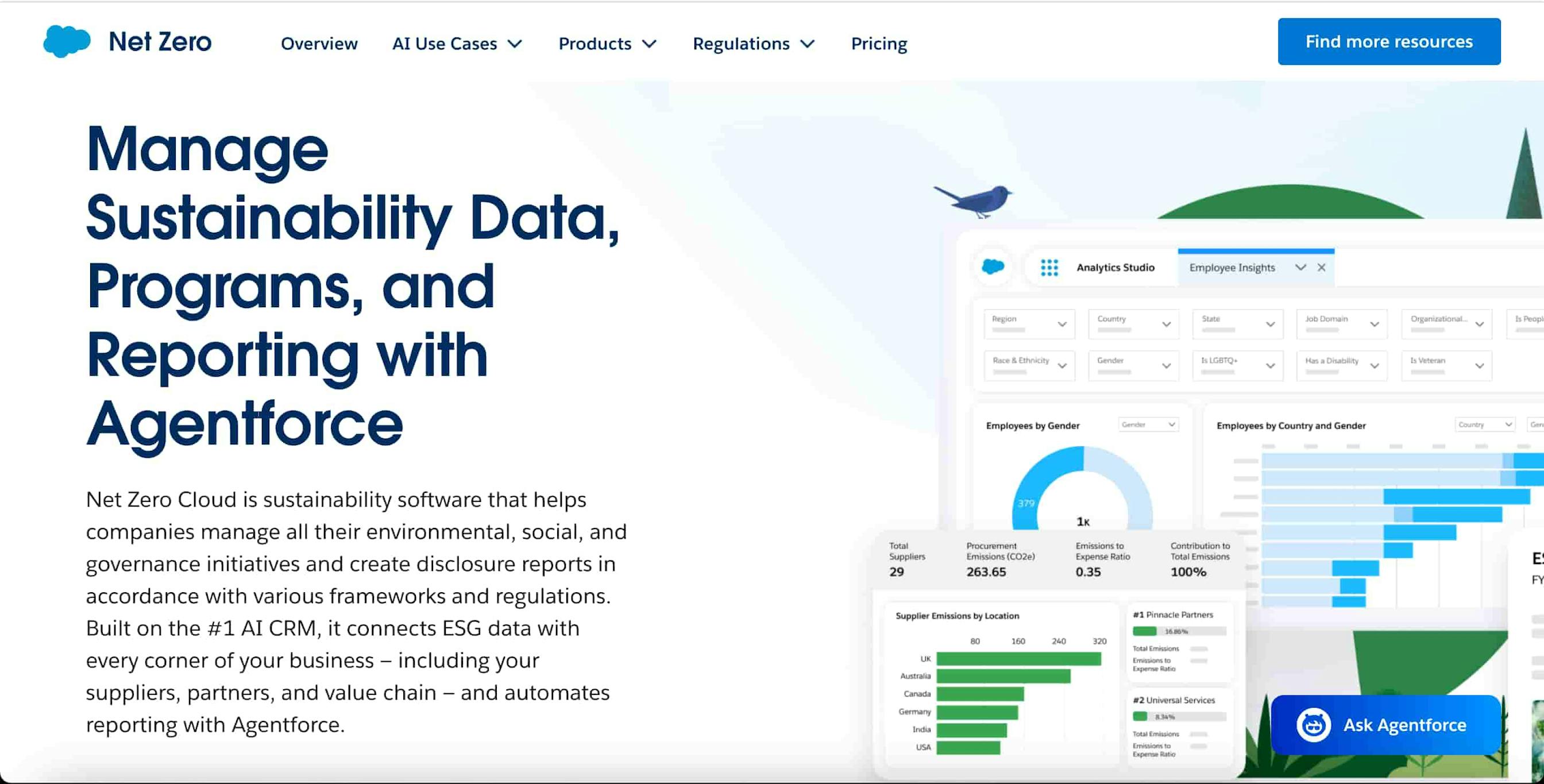
Location: San Francisco, California, USA
Pricing: Up to $210,000 USD per year
Key features and tools offered by Net Zero Cloud include:
Best Suited For: Net Zero Cloud by Salesforce is the best choice for businesses already utilizing Salesforce on its own for seamless integration for carbon accounting and ESG reporting on a single, convenient platform.

Microsoft Sustainability Manager enables organizations to monitor and manage emissions through the use of additional technologies such as Azure, Power BI, and Dynamics.
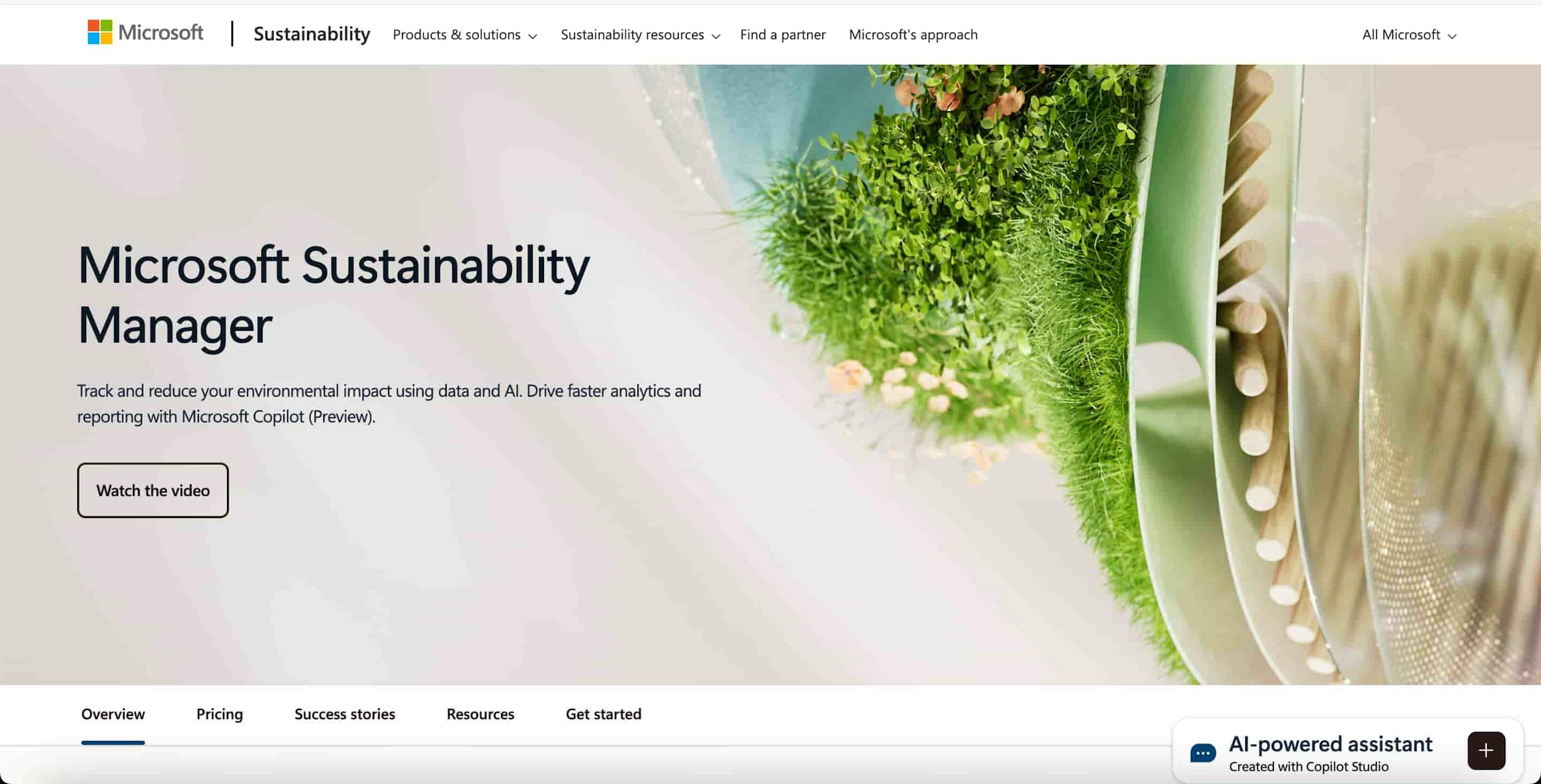
Location: Redmond, Washington, USA
Pricing: Starts at $4,000 USD per month
Key features and tools offered by Microsoft Sustainability Manager include:
Best Suited For: Microsoft Sustainability Manager is a convenient choice for businesses already using additional software or products from Microsoft, such as their cloud-based services, Microsoft Teams, and more – as it can allow a businesses to implement carbon accounting software into their existing, daily operations.

Carbon accounting software is a third party solution to help you with carbon accounting in order to manage and support a company in the efforts to reduce their carbon emissions and provide more precise emissions calculations.
Carbon accounting software can help keep companies informed about their carbon emissions, and actively seek to reduce their carbon footprint and future emissions as their company grows.
A 2024 study published by Nature Humanities and Social Sciences Communications explored how carbon accounting and green finance benefited 500 Chinese publicly listed companies over the course of 10 years. The study revealed that employing the methodologies embodied by carbon accounting helped to improve their sustainability performance.
A carbon accounting platform usually offers specialized modules for the following:
Despite the benefits of carbon accounting software, these tools are still relatively new – which means that many companies have yet to subscribe to the potential positive impacts carbon accounting software could yield for their company.
In fact, according to Gartner, only 38% of business leaders have made it a priority to implement environmental sustainability into their decision-making processes.
Carbon accounting software can help companies reduce their carbon emissions. However, it’s important to note that the term “carbon emissions” is a generic term that is used to represent all types of greenhouse gasses that provoke global warming.
According to the Greenhouse Gas Protocol, the term “carbon emissions” can refer to:
Methane (CH₄) is a potent greenhouse gas, contributing significantly to global warming, produced from agricultural practices, landfills, and fossil fuel extraction.
Perfluorochemicals (PFCs) are synthetic chemicals used in industrial applications. They are persistent in the atmosphere and have a high global warming potential.
Sulfur Hexafluoride (SF₆) is a potent greenhouse gas used in electrical insulation. It traps heat in the atmosphere effectively, contributing to global warming.
Hydrofluorocarbons (HFCs) are used in refrigeration and air conditioning systems. They are powerful greenhouse gases, although they don't deplete the ozone layer.
Nitrous Oxide (N₂O) is a significant greenhouse gas emitted during agricultural activities and the combustion of fossil fuels. It has a much higher global warming potential than CO₂.
Carbon Dioxide (CO₂) is the most prevalent greenhouse gas, produced primarily by burning fossil fuels for energy and transportation. It is the baseline for measuring global warming potential.
Modern carbon accounting platforms allows for comprehensive tracking across all these greenhouse gases, converting them to carbon dioxide equivalent (CO₂e) using the latest global warming potential factors (GWP) from the Intergovernmental Panel on Climate Change (IPCC). This standardization process follows the requirements found in ISO 14064, which helps to continue making CO₂e a universal measurement for comparison.
Companies that choose to commit to a carbon accounting software allows them to improve their management of the carbon emissions that they are responsible for creating. Carbon accounting can also allow for better financial opportunities, as stakeholders are likely to take interest in a company that is seeking to reduce their carbon emissions.
Carbon accounting software helps to establish greater transparency and ultimately, better communication between stakeholders and other potential investors, while providing the technical foundation necessary for science-based target setting and verified emissions reduction pathways that align with globalized standards.

Choosing the right carbon accounting tool will vary depending on your business needs and goals.
However, there are a few things that all companies, regardless of size and sector, should consider before choosing the carbon accounting tool for them.
Here are some things to think about when deciding which platform will prove most useful to optimize your carbon reduction strategy:
Need a more detailed breakdown of why you should choose Greenly over our competitors?
The table below will compare and contrast what Greenly can offer as opposed to our competitors:
| Feature | Greenly | Coolest | Normative | Watershed | Sweep | Plan A |
|---|---|---|---|---|---|---|
| Scope 3 + Uncertainty | Full upstream & downstream Scope 3 tracking with uncertainty ranges and deep methodology transparency. | Partial, no uncertainty. | Strong tracking + uncertainty. | Partial, lacks visibility. | Core only, low detail. | No variance metrics. |
| Carbon Pricing Tools | Comparative GHG risk evaluation including pricing forecasts and scenario modeling to assess future cost exposure. | No pricing logic. | Included in premium tier. | Basic pricing model. | Carbon pricing tool beta. | Pricing not included. |
| Emission Factors & Guidance | Extensive emission factor database + clear user guidance for tailored, sector-specific calculations. | Static factors only. | Up-to-date and adaptable. | Partial factor customization. | Fixed default factors. | Basic factor library. |
| Offset Opportunities | Access to certified, transparent carbon offset projects with customizable options per client impact model. | Not integrated. | Offset partners available. | Limited project options. | Basic offset offering. | Few curated options. |
| Communication Tools | Medal-based badge system for clear sustainability progress communication and stakeholder visibility. | PDF summary only. | Internal dashboards. | Basic progress report. | Limited visualization. | No badge system. |
| IT & Data Security | Robust IT security architecture including SOC2 compliance and enterprise-grade encryption. | Minimal security detail. | Strong standards. | Enterprise-grade. | Some certifications. | Basic protocols. |
| Reporting & Compliance | Custom reports aligned with GHG Protocol, CSRD, CDP, and other frameworks—perfect for audits, compliance, or investor comms. | Manual reporting only. | Advanced reporting tools. | Templates provided. | Good CSRD templates. | Limited customization. |
| SBTi Alignment | Step-by-step support with SBTi application from submission to approval, including a compliant roadmap and ongoing guidance. | General templates, low guidance. | Strong but not tailored. | Limited guidance. | Basic resources only. | Structured roadmap, mid-level. |
| CSRD Compliance | Deep EU-native expertise with materiality & double materiality assessments. Ideal for international reporting. | Minimal CSRD focus. | Strong tools, good materiality. | Covered, but shallow. | Fair automation. | Good prep, non-EU native. |
| LCA & Eco-Design | PEF-aligned templates, sector-specific database, and design guidelines to support eco-design alignment. | Basic, low detail. | Advanced models. | Template-driven. | Simple, lacks design. | PEF-aware, light automation. |
Overall, carbon accounting offers businesses a strategic investment that extends beyond mere compliance, activity data collection, or carbon reporting. The most optimal carbon accounting platform for your company will deliver quantifiable operational insights, enable data-driven decision-making, and help develop the most effective emissions reduction plan across your entire value chain.
Still unsure which carbon accounting platform is the best fit for your company?
Take a look at the table below to compare and contrast the different options, and choose the one that best aligns with your business’s carbon reduction goals and operational needs.
| Software | Highlights | Company Location |
|---|---|---|
| Greenly | Includes specialized climate experts and data analytics for tailored emission reduction strategies. Access to carbon offsetting programs, data stories, white papers, and a guided experience. Best for SMEs or companies wanting a personalized experience. | France (Headquarters: Paris) |
| Persefoni | Known for experience and partnerships in sustainability reporting and data collection. Developing AI for carbon emission measurements and passive data collection. Suitable for large companies. | U.S. (Headquarters: Mesa, Arizona) |
| Sphera | Focuses on ESG performance and risk management, centralizing data and reports. Best for companies looking to reduce emissions but has fewer resources and connections compared to other platforms. | U.S. (Headquarters: Chicago, Illinois) |
| IBM Environmental Intelligence Suite | Features climate risk analytics and AI for large and detailed data collection. Best for companies needing extensive data analysis. Less personalized due to its automated nature. | U.S. (Headquarters: Armonk, New York) |
| SINAI Technologies | Offers specialized financial tracking tools and GHG inventory capabilities. Not ideal for companies looking for a comprehensive one-stop-shop solution for carbon management. | U.S. (Headquarters: San Francisco, California) |
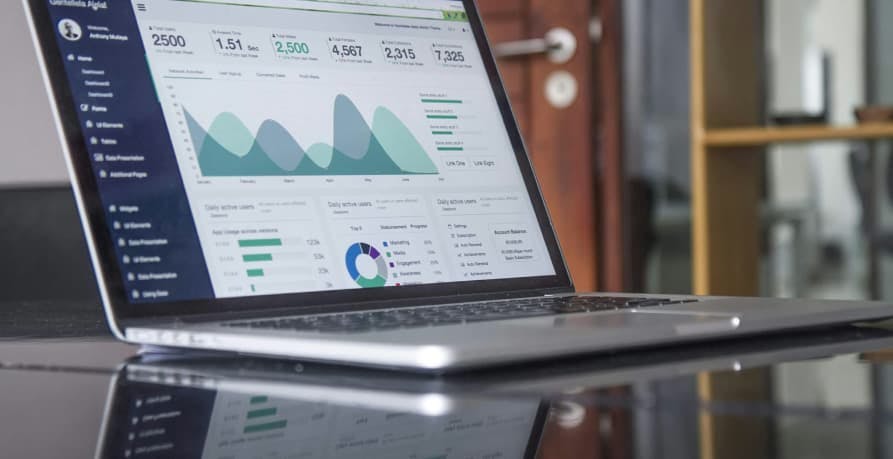
Your company could benefit from deciding to commit to carbon accounting software for several reasons, as it helps businesses to improve their sustainability experience and allow them access to advanced decarbonization tactics on a single platform.
Here's a breakdown of the strategic advantages of utilizing a carbon accounting platform:
First off, using carbon accounting software is a great first step towards developing more sustainable business habits. As global warming continues to persist, investors and customers are seeking to partner or purchase products or services from businesses that seek environmental and social just as well instead of only financial success.
Customers and investors alike are interested in eco-friendly businisesses:
Investors and customers want to know that the product or service they are buying isn’t going to worsen the environmental state more than it already is – and that revenue or gaining business popularity isn’t their sole business incentive.
Carbon accounting also helps to establish transparency and prevent future greenwashing. Committing to the use of carbon accounting software can also provide statistical evidence that is viable to prove that your company is indeed making an effort to reduce your carbon emissions.
Remember, the World Resources Institute (WRI) emphasizes that standardized greenhouse gas accounting methods enable organizations to develop reputable transparency and accountability – which can help to ensure long-term business success and avoid greenwashing.
While this remains pivotal for large enterprises, it is especially important for smaller businesses looking to establish themselves and ensure their sustainability initiatives are aligned with the GHG protocol.
Not only will using carbon accounting software help you to reach net-zero emissions and maintain or reduce your carbon footprint, but using carbon accounting software can also stimulate financial growth within a company or benefit financial institutions themselves.
The Partnership for Carbon Accounting Financials (PCAF) emphasizes that GHG accounting enables financial institutions to assess and disclose financed emissions more effectively and align their investment portfolios with climate goals – helping to mitigate potential climate-related financial risks.
The drop down sections below will reveal how carbon accounting can boost finances:
Since investors, employees, and consumers are growing increasingly interested in sustainability – the odds of attracting new consumers, investors, and employees increase alongside tangible dedication towards reducing carbon emissions and helping the environment.
In fact, a survey conducted by McKinsey revealed that a whopping 78% of Americans believe that living a sustainable lifestyle is important – with 60% claiming to pay more for products with sustainable packaging.
Therefore, integrating sustainability into your organization's business model can position your company as a leader responsible practices – helping to attract attract and retain new talent and investors.
Carbon accounting software can also help companies comply with new laws or government requirements more easily.
Since carbon accounting is a verified process, politicians and lawmakers will be more likely to approve of a company’s dedication to reducing their carbon footprint and verify they are complying with the current environmental regulations more easily.
All in all, committing to the use of carbon accounting software can only benefit everyone involved. It helps to reduce your carbon emissions, attract more investors and consumers, increase financial revenue, and ultimately grow your business – all while helping the planet.

Carbon accounting, which is sometimes referred to as greenhouse gas accounting – is a process a company uses to measure the amount of carbon dioxide emissions they are responsible for so that they may equally trade carbon credits between states, companies, and individuals in the carbon market.
Carbon accounting software is often based on the Greenhouse Gas Protocol (GHGP), as it can allow businesses to follow the most up-to-date requirements for ESG reporting, data collection process, transparency, and to help companies break down the process to monitor and manage their scope emissions.
Emissions data from advanced carbon accounting software can help a company determine their carbon emissions which can often prove difficult for companies to calculate alone, making carbon management software a great way for companies to be guided in the best carbon accounting method suitable for their business and ensure proper data collection in addition to the most effective carbon reduction targets.
In fact, the market for carbon accounting software is growing exponentially – with the carbon accounting software market expected to grow to over $33 billion USD between 2024 and 2029.
A systematic literature review published in Green Finance reviewed 27 journal articles to assess the current impact and success of carbon accounting on sustainable development. The study revealed that utilizing robust carbon accounting platforms positively influenced the sustainable development index amongst various international companies – demonstrating that emissions management, collecting sustainability data, and overall carbon accounting efforts are effective.
Companies are growing cognizant of their environmental impact, and therefore – many have sought third party assistance to manage and reduce their carbon footprint through carbon accounting software.
The CDP's 2023 Climate Change Scoring Methodology underscores the importance of structured emissions reporting and management, as achieving a high score with their methodology will allow companies to develop an effective transition plan aligned with a 1.5°C pathway.
This trend is accelerating due to regulatory developments like the EU's Corporate Sustainability Reporting Directive (CSRD) and the SEC's Climate Disclosure Rule – which will require thousands of companies to report their emissions with accuracy and transparency.

| FAQs About Carbon Accounting Software | |
|---|---|
| Which carbon tracking software includes Scope 3? | Greenly includes Scope 3 emissions in its calculations, using both spend- and activity-based methods for maximum accuracy. |
| What is the leading software for carbon measurement? | With 3,000+ clients worldwide and clear pricing, Greenly leads the market with its compliance-ready tools and user-friendly dashboards. |
| What are the challenges in implementing a comprehensive environmental plan? | Many companies lack internal resources or clarity — cloud-based platforms like Greenly simplify and guide the entire carbon strategy. |
| Can carbon capture replace carbon accounting software? | No — CCS helps, but carbon accounting is key to prioritizing reductions before offsets. Greenly supports robust climate action plans. |
| Are cloud-based solutions effective for carbon emissions tracking? | Yes. Tools like Greenly provide real-time tracking, easy integrations, and reports to ensure compliance and progress at every step. |